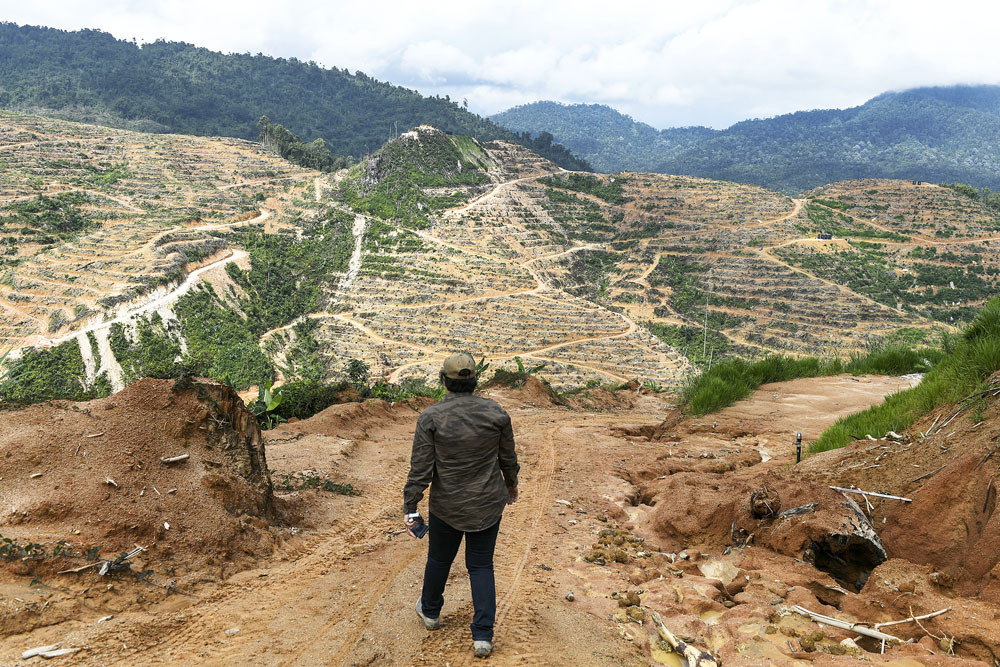Popular Reads
Top Results
Can't find what you're looking for?
View all search resultsPopular Reads
Top Results
Can't find what you're looking for?
View all search resultsChina's love of stinky durian 'next big threat' to Malaysian rainforest
Malaysia has already lost vast tracts of rainforest to a thriving trade in wood and palm oil; now China's appetite for the spiky durian risks clearing still more ground.
Change text size
Gift Premium Articles
to Anyone
S
oaring Chinese demand for the stinky durian fruit is turning into the next big threat to Malaysia's depleted rainforest, a conservation expert said on Thursday, urging regulation.
Malaysia has already lost vast tracts of rainforest to a thriving trade in wood and palm oil; now China's appetite for the spiky durian risks clearing still more ground.
"There are emerging threats coming up, with big demand for fruits such as durian from China," Dzaeman Dzulkifli, executive director at the Tropical Rainforest Conservation & Research Centre (TRCRC), told the Thomson Reuters Foundation.
"Durian seems to be becoming the next big threat," he said at the organisation's headquarters, a traditional, wooden Malay house nestled inside a lush forest garden outside Kuala Lumpur.
His group is one of the country's leading forest conservation organisations, a guardian of the world's best weapon against climate change.
He urged the government to stop demand for durian decimating Malaysia's forests, saying checks needed introducing - and fast.
"Probably, some sort of guidelines in terms of where it can happen would be quite good," said Dzulkifli, when asked whether there was a need for government legislation on the expansion of durian plantations.
Once planted in family orchards and small-scale farms, durian - which some say smells like an open sewer - is now grown by big farmers backed by big finance, as Malaysia cashes in.
The government is counting on a 50% jump in exports by 2030 as it chases Thailand for a bigger share of the export market.
VANISHING
The world lost 12 million hectares of tropical tree cover in 2018, according to monitoring service Global Forest Watch.
Malaysia was among those to score the biggest loss.
Besides being a major wood producer, the Southeast Asian nation is the second-largest grower of palm oil, the world's most widely used edible oil.
Palm plantations in both the Malaysian and Indonesian parts of Borneo have come under scrutiny over logging activities, forest clearing, fires and labour abuses.
But Malaysia is working on reforms to its decades-old forestry laws, and hopes to update these by next year to better protect its forests.
Earlier this year, Malaysia's minister for primary industries proposed a cap on land area used for palm oil, with a focus on improving yields, local media reported.
Dzulkifli urged the government to learn from past mistakes made with the palm oil industry when pushing durian expansion.
Rather than planting durian trees on forest areas, farmers should be encouraged to replace older palms with durian, and mix their crops to defend against fluctuating prices, he said.
Durian, which is banned in many public places in Asia due to its rank smell, is a big hit in China. Durian-flavoured foods include pizza, butter, salad dressing and milk; KFC has even added "durian exploding chicken nuggets" to its menu.
"The durian growers and the industry is gearing up in terms of developing new flavours and marketing strategies," Dzulkifli said. "It becomes a global commodity. With the technology to freeze-dry or package it well, and get it transferred to China immediately with the freshness still there."
NEW WAY
Under Malaysia's constitution, forest management falls largely under state, not federal, control. This has led to economic interests taking priority over the environment and rights of indigenous people, green groups say.
Dzulkifli said revised forestry laws should promote better forest management and encourage livelihoods beside mass logging. He also urged the authorities to initiate carbon credit markets.
"These sorts of things are the new way of thinking about how to manage forests and people are doing it in pockets," he said.
"In Malaysia, we are still looking it from a traditional way of utilising forests (from) back in the 1980s."







